MAR013-1: Intercultural Competence in Business - Report Analysis
VerifiedAdded on 2022/08/26
|9
|2288
|28
Report
AI Summary
This report delves into the concept of intercultural competence in a business context. It explores the ability to understand, value, and respect diverse cultures within a society. The report examines the author's personal experiences as a South Indian, including their family's views on religion and culture, and their willingness to participate in other cultures' religious festivals. It addresses the presence of equality within the family, and experiences with racial discrimination. The report also considers the author's perspective on the importance of North Indian culture and includes a reference list of relevant sources. This report demonstrates an understanding of intercultural communication and self-awareness. The report fulfills the assignment brief by creating an intercultural biography through interviews and comparing and contrasting the information, analyzing the results using appropriate intercultural concepts.

Running head: INTERCULTURAL COMPETENCE IN BUSINESS
Intercultural Competence in Business
Name of the Student:
Name of the University:
Author note:
Intercultural Competence in Business
Name of the Student:
Name of the University:
Author note:
Paraphrase This Document
Need a fresh take? Get an instant paraphrase of this document with our AI Paraphraser
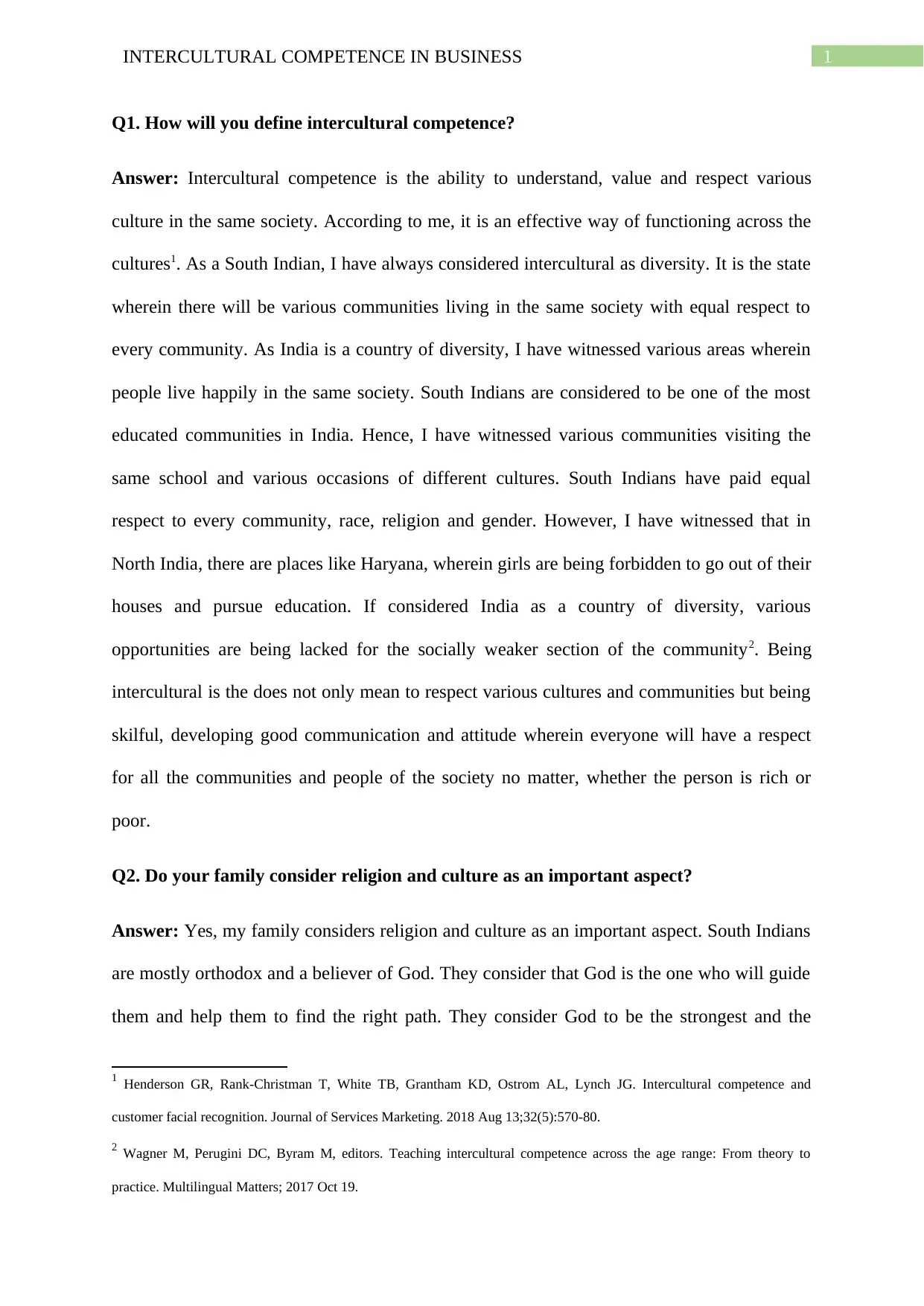
1INTERCULTURAL COMPETENCE IN BUSINESS
Q1. How will you define intercultural competence?
Answer: Intercultural competence is the ability to understand, value and respect various
culture in the same society. According to me, it is an effective way of functioning across the
cultures1. As a South Indian, I have always considered intercultural as diversity. It is the state
wherein there will be various communities living in the same society with equal respect to
every community. As India is a country of diversity, I have witnessed various areas wherein
people live happily in the same society. South Indians are considered to be one of the most
educated communities in India. Hence, I have witnessed various communities visiting the
same school and various occasions of different cultures. South Indians have paid equal
respect to every community, race, religion and gender. However, I have witnessed that in
North India, there are places like Haryana, wherein girls are being forbidden to go out of their
houses and pursue education. If considered India as a country of diversity, various
opportunities are being lacked for the socially weaker section of the community2. Being
intercultural is the does not only mean to respect various cultures and communities but being
skilful, developing good communication and attitude wherein everyone will have a respect
for all the communities and people of the society no matter, whether the person is rich or
poor.
Q2. Do your family consider religion and culture as an important aspect?
Answer: Yes, my family considers religion and culture as an important aspect. South Indians
are mostly orthodox and a believer of God. They consider that God is the one who will guide
them and help them to find the right path. They consider God to be the strongest and the
1 Henderson GR, Rank-Christman T, White TB, Grantham KD, Ostrom AL, Lynch JG. Intercultural competence and
customer facial recognition. Journal of Services Marketing. 2018 Aug 13;32(5):570-80.
2 Wagner M, Perugini DC, Byram M, editors. Teaching intercultural competence across the age range: From theory to
practice. Multilingual Matters; 2017 Oct 19.
Q1. How will you define intercultural competence?
Answer: Intercultural competence is the ability to understand, value and respect various
culture in the same society. According to me, it is an effective way of functioning across the
cultures1. As a South Indian, I have always considered intercultural as diversity. It is the state
wherein there will be various communities living in the same society with equal respect to
every community. As India is a country of diversity, I have witnessed various areas wherein
people live happily in the same society. South Indians are considered to be one of the most
educated communities in India. Hence, I have witnessed various communities visiting the
same school and various occasions of different cultures. South Indians have paid equal
respect to every community, race, religion and gender. However, I have witnessed that in
North India, there are places like Haryana, wherein girls are being forbidden to go out of their
houses and pursue education. If considered India as a country of diversity, various
opportunities are being lacked for the socially weaker section of the community2. Being
intercultural is the does not only mean to respect various cultures and communities but being
skilful, developing good communication and attitude wherein everyone will have a respect
for all the communities and people of the society no matter, whether the person is rich or
poor.
Q2. Do your family consider religion and culture as an important aspect?
Answer: Yes, my family considers religion and culture as an important aspect. South Indians
are mostly orthodox and a believer of God. They consider that God is the one who will guide
them and help them to find the right path. They consider God to be the strongest and the
1 Henderson GR, Rank-Christman T, White TB, Grantham KD, Ostrom AL, Lynch JG. Intercultural competence and
customer facial recognition. Journal of Services Marketing. 2018 Aug 13;32(5):570-80.
2 Wagner M, Perugini DC, Byram M, editors. Teaching intercultural competence across the age range: From theory to
practice. Multilingual Matters; 2017 Oct 19.
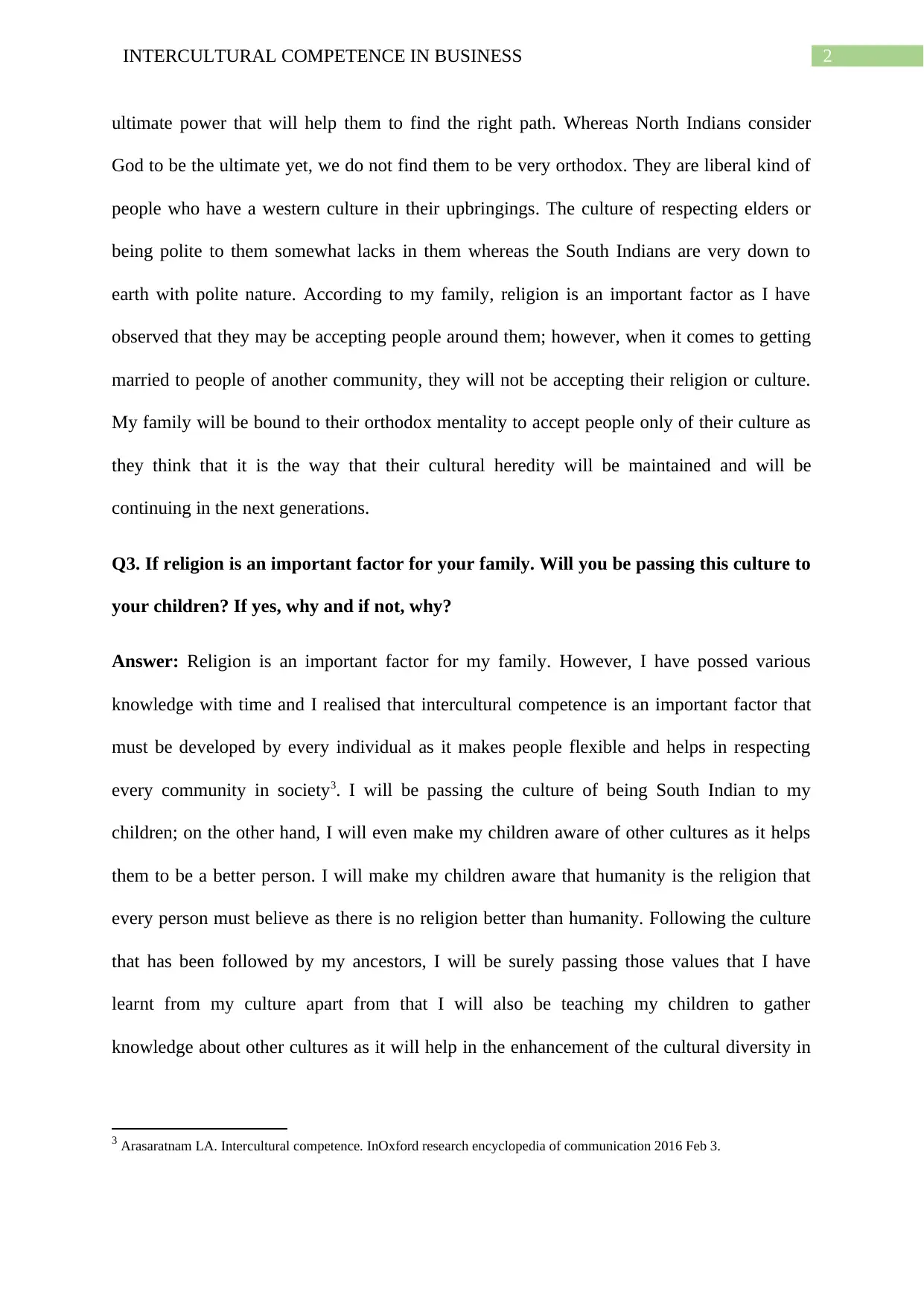
2INTERCULTURAL COMPETENCE IN BUSINESS
ultimate power that will help them to find the right path. Whereas North Indians consider
God to be the ultimate yet, we do not find them to be very orthodox. They are liberal kind of
people who have a western culture in their upbringings. The culture of respecting elders or
being polite to them somewhat lacks in them whereas the South Indians are very down to
earth with polite nature. According to my family, religion is an important factor as I have
observed that they may be accepting people around them; however, when it comes to getting
married to people of another community, they will not be accepting their religion or culture.
My family will be bound to their orthodox mentality to accept people only of their culture as
they think that it is the way that their cultural heredity will be maintained and will be
continuing in the next generations.
Q3. If religion is an important factor for your family. Will you be passing this culture to
your children? If yes, why and if not, why?
Answer: Religion is an important factor for my family. However, I have possed various
knowledge with time and I realised that intercultural competence is an important factor that
must be developed by every individual as it makes people flexible and helps in respecting
every community in society3. I will be passing the culture of being South Indian to my
children; on the other hand, I will even make my children aware of other cultures as it helps
them to be a better person. I will make my children aware that humanity is the religion that
every person must believe as there is no religion better than humanity. Following the culture
that has been followed by my ancestors, I will be surely passing those values that I have
learnt from my culture apart from that I will also be teaching my children to gather
knowledge about other cultures as it will help in the enhancement of the cultural diversity in
3 Arasaratnam LA. Intercultural competence. InOxford research encyclopedia of communication 2016 Feb 3.
ultimate power that will help them to find the right path. Whereas North Indians consider
God to be the ultimate yet, we do not find them to be very orthodox. They are liberal kind of
people who have a western culture in their upbringings. The culture of respecting elders or
being polite to them somewhat lacks in them whereas the South Indians are very down to
earth with polite nature. According to my family, religion is an important factor as I have
observed that they may be accepting people around them; however, when it comes to getting
married to people of another community, they will not be accepting their religion or culture.
My family will be bound to their orthodox mentality to accept people only of their culture as
they think that it is the way that their cultural heredity will be maintained and will be
continuing in the next generations.
Q3. If religion is an important factor for your family. Will you be passing this culture to
your children? If yes, why and if not, why?
Answer: Religion is an important factor for my family. However, I have possed various
knowledge with time and I realised that intercultural competence is an important factor that
must be developed by every individual as it makes people flexible and helps in respecting
every community in society3. I will be passing the culture of being South Indian to my
children; on the other hand, I will even make my children aware of other cultures as it helps
them to be a better person. I will make my children aware that humanity is the religion that
every person must believe as there is no religion better than humanity. Following the culture
that has been followed by my ancestors, I will be surely passing those values that I have
learnt from my culture apart from that I will also be teaching my children to gather
knowledge about other cultures as it will help in the enhancement of the cultural diversity in
3 Arasaratnam LA. Intercultural competence. InOxford research encyclopedia of communication 2016 Feb 3.
⊘ This is a preview!⊘
Do you want full access?
Subscribe today to unlock all pages.

Trusted by 1+ million students worldwide
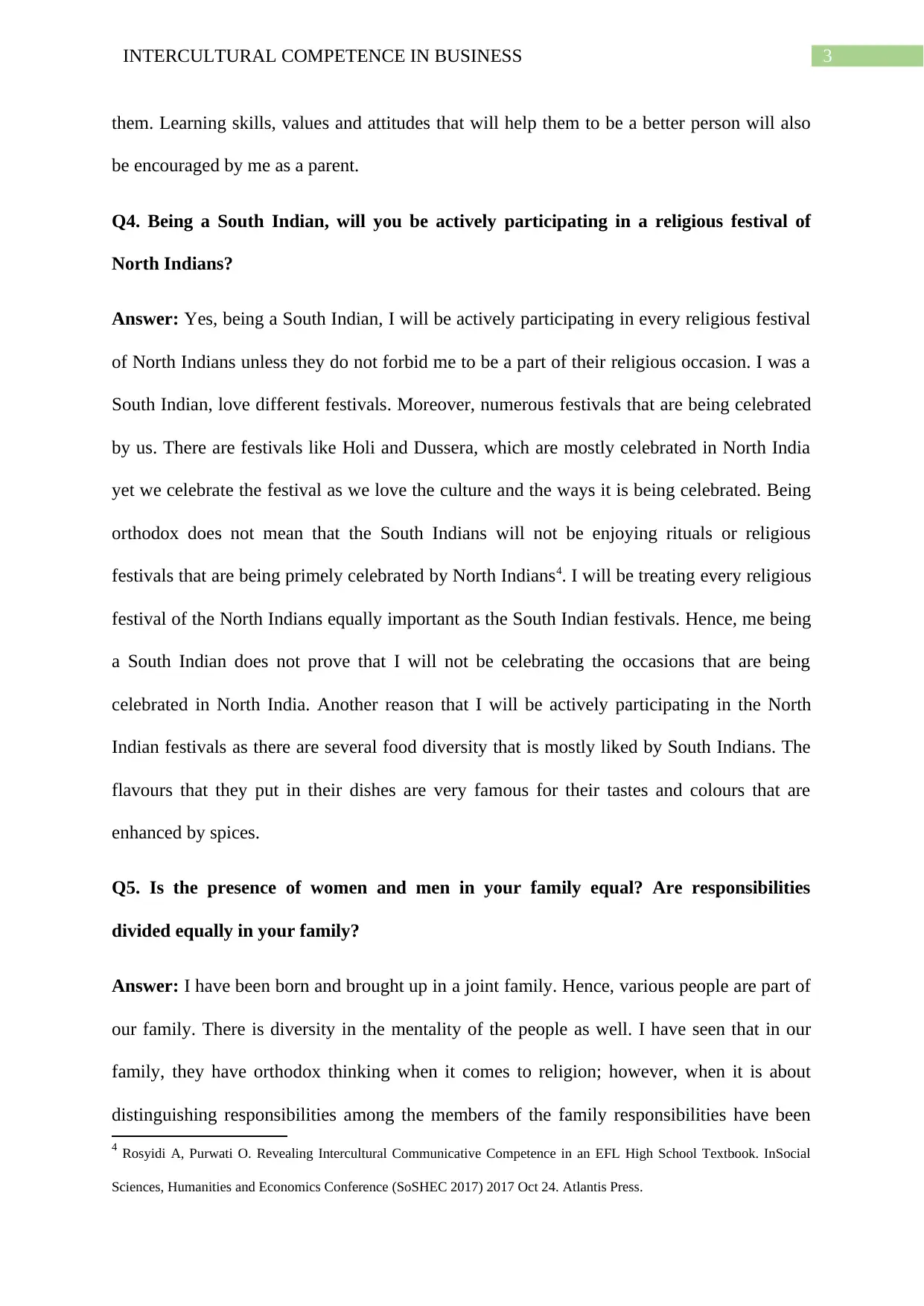
3INTERCULTURAL COMPETENCE IN BUSINESS
them. Learning skills, values and attitudes that will help them to be a better person will also
be encouraged by me as a parent.
Q4. Being a South Indian, will you be actively participating in a religious festival of
North Indians?
Answer: Yes, being a South Indian, I will be actively participating in every religious festival
of North Indians unless they do not forbid me to be a part of their religious occasion. I was a
South Indian, love different festivals. Moreover, numerous festivals that are being celebrated
by us. There are festivals like Holi and Dussera, which are mostly celebrated in North India
yet we celebrate the festival as we love the culture and the ways it is being celebrated. Being
orthodox does not mean that the South Indians will not be enjoying rituals or religious
festivals that are being primely celebrated by North Indians4. I will be treating every religious
festival of the North Indians equally important as the South Indian festivals. Hence, me being
a South Indian does not prove that I will not be celebrating the occasions that are being
celebrated in North India. Another reason that I will be actively participating in the North
Indian festivals as there are several food diversity that is mostly liked by South Indians. The
flavours that they put in their dishes are very famous for their tastes and colours that are
enhanced by spices.
Q5. Is the presence of women and men in your family equal? Are responsibilities
divided equally in your family?
Answer: I have been born and brought up in a joint family. Hence, various people are part of
our family. There is diversity in the mentality of the people as well. I have seen that in our
family, they have orthodox thinking when it comes to religion; however, when it is about
distinguishing responsibilities among the members of the family responsibilities have been
4 Rosyidi A, Purwati O. Revealing Intercultural Communicative Competence in an EFL High School Textbook. InSocial
Sciences, Humanities and Economics Conference (SoSHEC 2017) 2017 Oct 24. Atlantis Press.
them. Learning skills, values and attitudes that will help them to be a better person will also
be encouraged by me as a parent.
Q4. Being a South Indian, will you be actively participating in a religious festival of
North Indians?
Answer: Yes, being a South Indian, I will be actively participating in every religious festival
of North Indians unless they do not forbid me to be a part of their religious occasion. I was a
South Indian, love different festivals. Moreover, numerous festivals that are being celebrated
by us. There are festivals like Holi and Dussera, which are mostly celebrated in North India
yet we celebrate the festival as we love the culture and the ways it is being celebrated. Being
orthodox does not mean that the South Indians will not be enjoying rituals or religious
festivals that are being primely celebrated by North Indians4. I will be treating every religious
festival of the North Indians equally important as the South Indian festivals. Hence, me being
a South Indian does not prove that I will not be celebrating the occasions that are being
celebrated in North India. Another reason that I will be actively participating in the North
Indian festivals as there are several food diversity that is mostly liked by South Indians. The
flavours that they put in their dishes are very famous for their tastes and colours that are
enhanced by spices.
Q5. Is the presence of women and men in your family equal? Are responsibilities
divided equally in your family?
Answer: I have been born and brought up in a joint family. Hence, various people are part of
our family. There is diversity in the mentality of the people as well. I have seen that in our
family, they have orthodox thinking when it comes to religion; however, when it is about
distinguishing responsibilities among the members of the family responsibilities have been
4 Rosyidi A, Purwati O. Revealing Intercultural Communicative Competence in an EFL High School Textbook. InSocial
Sciences, Humanities and Economics Conference (SoSHEC 2017) 2017 Oct 24. Atlantis Press.
Paraphrase This Document
Need a fresh take? Get an instant paraphrase of this document with our AI Paraphraser
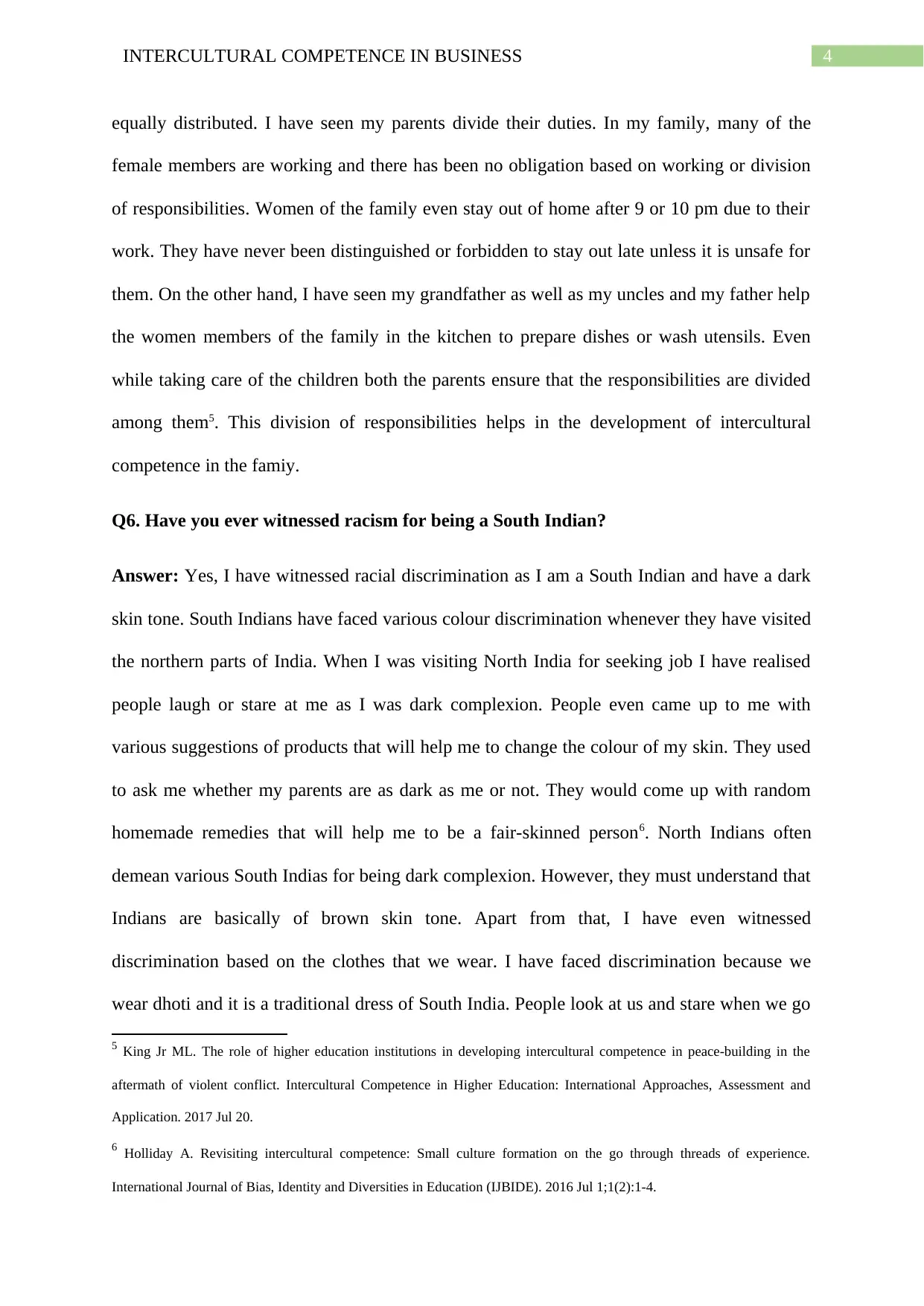
4INTERCULTURAL COMPETENCE IN BUSINESS
equally distributed. I have seen my parents divide their duties. In my family, many of the
female members are working and there has been no obligation based on working or division
of responsibilities. Women of the family even stay out of home after 9 or 10 pm due to their
work. They have never been distinguished or forbidden to stay out late unless it is unsafe for
them. On the other hand, I have seen my grandfather as well as my uncles and my father help
the women members of the family in the kitchen to prepare dishes or wash utensils. Even
while taking care of the children both the parents ensure that the responsibilities are divided
among them5. This division of responsibilities helps in the development of intercultural
competence in the famiy.
Q6. Have you ever witnessed racism for being a South Indian?
Answer: Yes, I have witnessed racial discrimination as I am a South Indian and have a dark
skin tone. South Indians have faced various colour discrimination whenever they have visited
the northern parts of India. When I was visiting North India for seeking job I have realised
people laugh or stare at me as I was dark complexion. People even came up to me with
various suggestions of products that will help me to change the colour of my skin. They used
to ask me whether my parents are as dark as me or not. They would come up with random
homemade remedies that will help me to be a fair-skinned person6. North Indians often
demean various South Indias for being dark complexion. However, they must understand that
Indians are basically of brown skin tone. Apart from that, I have even witnessed
discrimination based on the clothes that we wear. I have faced discrimination because we
wear dhoti and it is a traditional dress of South India. People look at us and stare when we go
5 King Jr ML. The role of higher education institutions in developing intercultural competence in peace-building in the
aftermath of violent conflict. Intercultural Competence in Higher Education: International Approaches, Assessment and
Application. 2017 Jul 20.
6 Holliday A. Revisiting intercultural competence: Small culture formation on the go through threads of experience.
International Journal of Bias, Identity and Diversities in Education (IJBIDE). 2016 Jul 1;1(2):1-4.
equally distributed. I have seen my parents divide their duties. In my family, many of the
female members are working and there has been no obligation based on working or division
of responsibilities. Women of the family even stay out of home after 9 or 10 pm due to their
work. They have never been distinguished or forbidden to stay out late unless it is unsafe for
them. On the other hand, I have seen my grandfather as well as my uncles and my father help
the women members of the family in the kitchen to prepare dishes or wash utensils. Even
while taking care of the children both the parents ensure that the responsibilities are divided
among them5. This division of responsibilities helps in the development of intercultural
competence in the famiy.
Q6. Have you ever witnessed racism for being a South Indian?
Answer: Yes, I have witnessed racial discrimination as I am a South Indian and have a dark
skin tone. South Indians have faced various colour discrimination whenever they have visited
the northern parts of India. When I was visiting North India for seeking job I have realised
people laugh or stare at me as I was dark complexion. People even came up to me with
various suggestions of products that will help me to change the colour of my skin. They used
to ask me whether my parents are as dark as me or not. They would come up with random
homemade remedies that will help me to be a fair-skinned person6. North Indians often
demean various South Indias for being dark complexion. However, they must understand that
Indians are basically of brown skin tone. Apart from that, I have even witnessed
discrimination based on the clothes that we wear. I have faced discrimination because we
wear dhoti and it is a traditional dress of South India. People look at us and stare when we go
5 King Jr ML. The role of higher education institutions in developing intercultural competence in peace-building in the
aftermath of violent conflict. Intercultural Competence in Higher Education: International Approaches, Assessment and
Application. 2017 Jul 20.
6 Holliday A. Revisiting intercultural competence: Small culture formation on the go through threads of experience.
International Journal of Bias, Identity and Diversities in Education (IJBIDE). 2016 Jul 1;1(2):1-4.
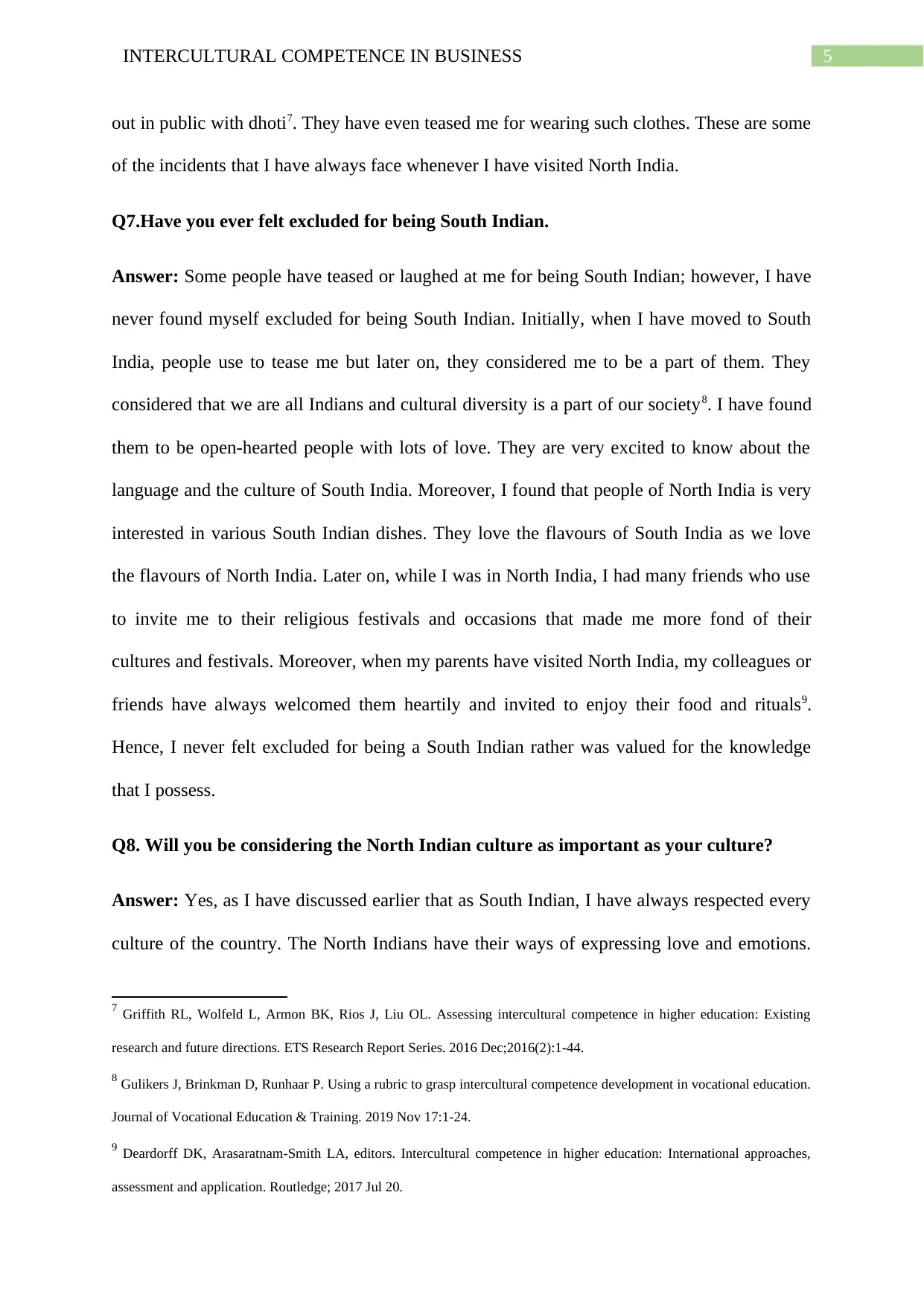
5INTERCULTURAL COMPETENCE IN BUSINESS
out in public with dhoti7. They have even teased me for wearing such clothes. These are some
of the incidents that I have always face whenever I have visited North India.
Q7.Have you ever felt excluded for being South Indian.
Answer: Some people have teased or laughed at me for being South Indian; however, I have
never found myself excluded for being South Indian. Initially, when I have moved to South
India, people use to tease me but later on, they considered me to be a part of them. They
considered that we are all Indians and cultural diversity is a part of our society8. I have found
them to be open-hearted people with lots of love. They are very excited to know about the
language and the culture of South India. Moreover, I found that people of North India is very
interested in various South Indian dishes. They love the flavours of South India as we love
the flavours of North India. Later on, while I was in North India, I had many friends who use
to invite me to their religious festivals and occasions that made me more fond of their
cultures and festivals. Moreover, when my parents have visited North India, my colleagues or
friends have always welcomed them heartily and invited to enjoy their food and rituals9.
Hence, I never felt excluded for being a South Indian rather was valued for the knowledge
that I possess.
Q8. Will you be considering the North Indian culture as important as your culture?
Answer: Yes, as I have discussed earlier that as South Indian, I have always respected every
culture of the country. The North Indians have their ways of expressing love and emotions.
7 Griffith RL, Wolfeld L, Armon BK, Rios J, Liu OL. Assessing intercultural competence in higher education: Existing
research and future directions. ETS Research Report Series. 2016 Dec;2016(2):1-44.
8 Gulikers J, Brinkman D, Runhaar P. Using a rubric to grasp intercultural competence development in vocational education.
Journal of Vocational Education & Training. 2019 Nov 17:1-24.
9 Deardorff DK, Arasaratnam-Smith LA, editors. Intercultural competence in higher education: International approaches,
assessment and application. Routledge; 2017 Jul 20.
out in public with dhoti7. They have even teased me for wearing such clothes. These are some
of the incidents that I have always face whenever I have visited North India.
Q7.Have you ever felt excluded for being South Indian.
Answer: Some people have teased or laughed at me for being South Indian; however, I have
never found myself excluded for being South Indian. Initially, when I have moved to South
India, people use to tease me but later on, they considered me to be a part of them. They
considered that we are all Indians and cultural diversity is a part of our society8. I have found
them to be open-hearted people with lots of love. They are very excited to know about the
language and the culture of South India. Moreover, I found that people of North India is very
interested in various South Indian dishes. They love the flavours of South India as we love
the flavours of North India. Later on, while I was in North India, I had many friends who use
to invite me to their religious festivals and occasions that made me more fond of their
cultures and festivals. Moreover, when my parents have visited North India, my colleagues or
friends have always welcomed them heartily and invited to enjoy their food and rituals9.
Hence, I never felt excluded for being a South Indian rather was valued for the knowledge
that I possess.
Q8. Will you be considering the North Indian culture as important as your culture?
Answer: Yes, as I have discussed earlier that as South Indian, I have always respected every
culture of the country. The North Indians have their ways of expressing love and emotions.
7 Griffith RL, Wolfeld L, Armon BK, Rios J, Liu OL. Assessing intercultural competence in higher education: Existing
research and future directions. ETS Research Report Series. 2016 Dec;2016(2):1-44.
8 Gulikers J, Brinkman D, Runhaar P. Using a rubric to grasp intercultural competence development in vocational education.
Journal of Vocational Education & Training. 2019 Nov 17:1-24.
9 Deardorff DK, Arasaratnam-Smith LA, editors. Intercultural competence in higher education: International approaches,
assessment and application. Routledge; 2017 Jul 20.
⊘ This is a preview!⊘
Do you want full access?
Subscribe today to unlock all pages.

Trusted by 1+ million students worldwide
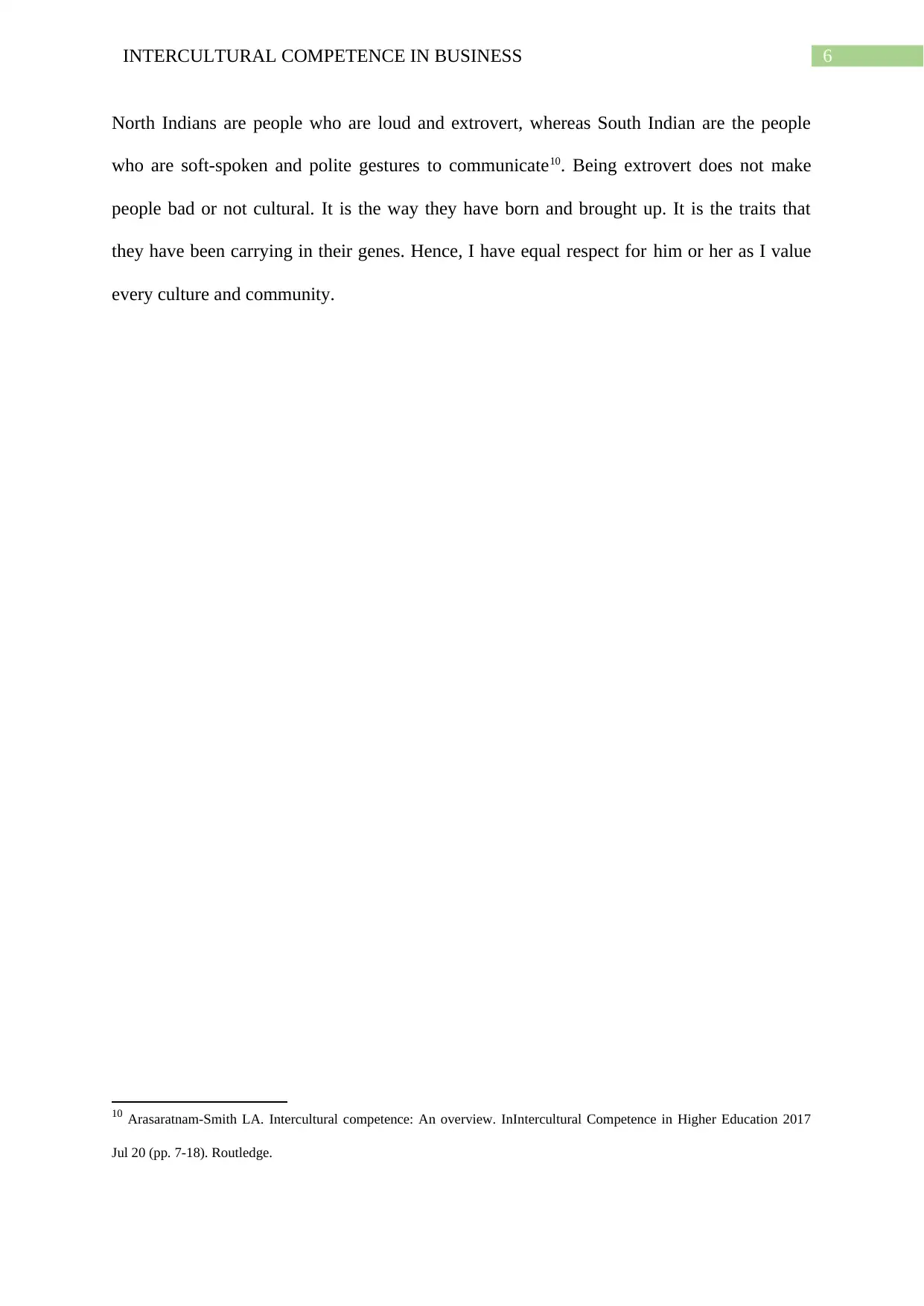
6INTERCULTURAL COMPETENCE IN BUSINESS
North Indians are people who are loud and extrovert, whereas South Indian are the people
who are soft-spoken and polite gestures to communicate10. Being extrovert does not make
people bad or not cultural. It is the way they have born and brought up. It is the traits that
they have been carrying in their genes. Hence, I have equal respect for him or her as I value
every culture and community.
10 Arasaratnam-Smith LA. Intercultural competence: An overview. InIntercultural Competence in Higher Education 2017
Jul 20 (pp. 7-18). Routledge.
North Indians are people who are loud and extrovert, whereas South Indian are the people
who are soft-spoken and polite gestures to communicate10. Being extrovert does not make
people bad or not cultural. It is the way they have born and brought up. It is the traits that
they have been carrying in their genes. Hence, I have equal respect for him or her as I value
every culture and community.
10 Arasaratnam-Smith LA. Intercultural competence: An overview. InIntercultural Competence in Higher Education 2017
Jul 20 (pp. 7-18). Routledge.
Paraphrase This Document
Need a fresh take? Get an instant paraphrase of this document with our AI Paraphraser
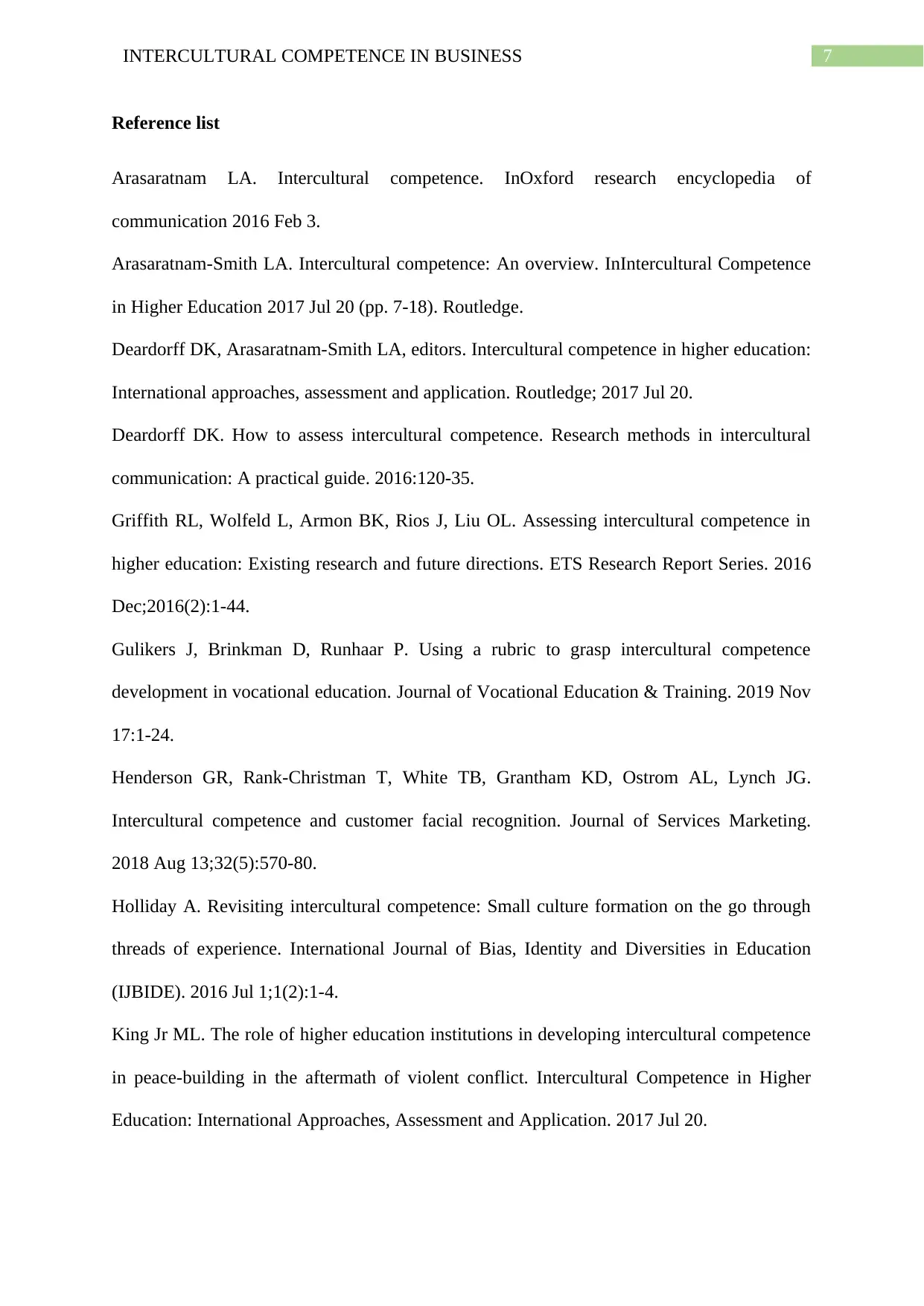
7INTERCULTURAL COMPETENCE IN BUSINESS
Reference list
Arasaratnam LA. Intercultural competence. InOxford research encyclopedia of
communication 2016 Feb 3.
Arasaratnam-Smith LA. Intercultural competence: An overview. InIntercultural Competence
in Higher Education 2017 Jul 20 (pp. 7-18). Routledge.
Deardorff DK, Arasaratnam-Smith LA, editors. Intercultural competence in higher education:
International approaches, assessment and application. Routledge; 2017 Jul 20.
Deardorff DK. How to assess intercultural competence. Research methods in intercultural
communication: A practical guide. 2016:120-35.
Griffith RL, Wolfeld L, Armon BK, Rios J, Liu OL. Assessing intercultural competence in
higher education: Existing research and future directions. ETS Research Report Series. 2016
Dec;2016(2):1-44.
Gulikers J, Brinkman D, Runhaar P. Using a rubric to grasp intercultural competence
development in vocational education. Journal of Vocational Education & Training. 2019 Nov
17:1-24.
Henderson GR, Rank-Christman T, White TB, Grantham KD, Ostrom AL, Lynch JG.
Intercultural competence and customer facial recognition. Journal of Services Marketing.
2018 Aug 13;32(5):570-80.
Holliday A. Revisiting intercultural competence: Small culture formation on the go through
threads of experience. International Journal of Bias, Identity and Diversities in Education
(IJBIDE). 2016 Jul 1;1(2):1-4.
King Jr ML. The role of higher education institutions in developing intercultural competence
in peace-building in the aftermath of violent conflict. Intercultural Competence in Higher
Education: International Approaches, Assessment and Application. 2017 Jul 20.
Reference list
Arasaratnam LA. Intercultural competence. InOxford research encyclopedia of
communication 2016 Feb 3.
Arasaratnam-Smith LA. Intercultural competence: An overview. InIntercultural Competence
in Higher Education 2017 Jul 20 (pp. 7-18). Routledge.
Deardorff DK, Arasaratnam-Smith LA, editors. Intercultural competence in higher education:
International approaches, assessment and application. Routledge; 2017 Jul 20.
Deardorff DK. How to assess intercultural competence. Research methods in intercultural
communication: A practical guide. 2016:120-35.
Griffith RL, Wolfeld L, Armon BK, Rios J, Liu OL. Assessing intercultural competence in
higher education: Existing research and future directions. ETS Research Report Series. 2016
Dec;2016(2):1-44.
Gulikers J, Brinkman D, Runhaar P. Using a rubric to grasp intercultural competence
development in vocational education. Journal of Vocational Education & Training. 2019 Nov
17:1-24.
Henderson GR, Rank-Christman T, White TB, Grantham KD, Ostrom AL, Lynch JG.
Intercultural competence and customer facial recognition. Journal of Services Marketing.
2018 Aug 13;32(5):570-80.
Holliday A. Revisiting intercultural competence: Small culture formation on the go through
threads of experience. International Journal of Bias, Identity and Diversities in Education
(IJBIDE). 2016 Jul 1;1(2):1-4.
King Jr ML. The role of higher education institutions in developing intercultural competence
in peace-building in the aftermath of violent conflict. Intercultural Competence in Higher
Education: International Approaches, Assessment and Application. 2017 Jul 20.
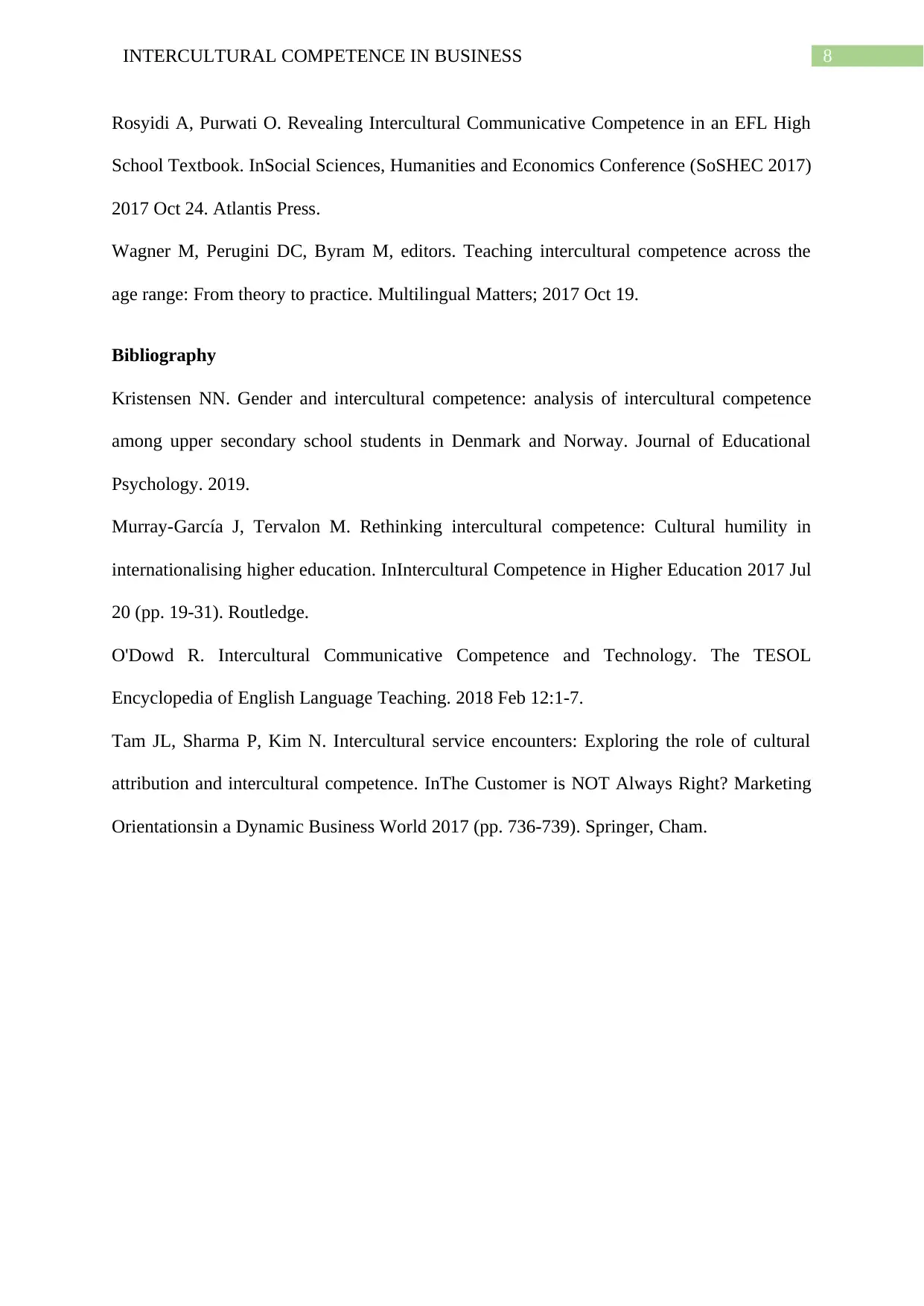
8INTERCULTURAL COMPETENCE IN BUSINESS
Rosyidi A, Purwati O. Revealing Intercultural Communicative Competence in an EFL High
School Textbook. InSocial Sciences, Humanities and Economics Conference (SoSHEC 2017)
2017 Oct 24. Atlantis Press.
Wagner M, Perugini DC, Byram M, editors. Teaching intercultural competence across the
age range: From theory to practice. Multilingual Matters; 2017 Oct 19.
Bibliography
Kristensen NN. Gender and intercultural competence: analysis of intercultural competence
among upper secondary school students in Denmark and Norway. Journal of Educational
Psychology. 2019.
Murray-García J, Tervalon M. Rethinking intercultural competence: Cultural humility in
internationalising higher education. InIntercultural Competence in Higher Education 2017 Jul
20 (pp. 19-31). Routledge.
O'Dowd R. Intercultural Communicative Competence and Technology. The TESOL
Encyclopedia of English Language Teaching. 2018 Feb 12:1-7.
Tam JL, Sharma P, Kim N. Intercultural service encounters: Exploring the role of cultural
attribution and intercultural competence. InThe Customer is NOT Always Right? Marketing
Orientationsin a Dynamic Business World 2017 (pp. 736-739). Springer, Cham.
Rosyidi A, Purwati O. Revealing Intercultural Communicative Competence in an EFL High
School Textbook. InSocial Sciences, Humanities and Economics Conference (SoSHEC 2017)
2017 Oct 24. Atlantis Press.
Wagner M, Perugini DC, Byram M, editors. Teaching intercultural competence across the
age range: From theory to practice. Multilingual Matters; 2017 Oct 19.
Bibliography
Kristensen NN. Gender and intercultural competence: analysis of intercultural competence
among upper secondary school students in Denmark and Norway. Journal of Educational
Psychology. 2019.
Murray-García J, Tervalon M. Rethinking intercultural competence: Cultural humility in
internationalising higher education. InIntercultural Competence in Higher Education 2017 Jul
20 (pp. 19-31). Routledge.
O'Dowd R. Intercultural Communicative Competence and Technology. The TESOL
Encyclopedia of English Language Teaching. 2018 Feb 12:1-7.
Tam JL, Sharma P, Kim N. Intercultural service encounters: Exploring the role of cultural
attribution and intercultural competence. InThe Customer is NOT Always Right? Marketing
Orientationsin a Dynamic Business World 2017 (pp. 736-739). Springer, Cham.
⊘ This is a preview!⊘
Do you want full access?
Subscribe today to unlock all pages.

Trusted by 1+ million students worldwide
1 out of 9
Related Documents
Your All-in-One AI-Powered Toolkit for Academic Success.
+13062052269
info@desklib.com
Available 24*7 on WhatsApp / Email
![[object Object]](/_next/static/media/star-bottom.7253800d.svg)
Unlock your academic potential
Copyright © 2020–2026 A2Z Services. All Rights Reserved. Developed and managed by ZUCOL.





